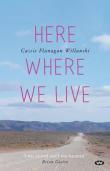AustLit
Latest Issues
AbstractHistoryArchive Description
'That's the thing about climate change, it comes home to you. In our case, literally - the fifth night after my husband's departure, while the children and I were sleeping in the front bedrooms, the old tree next door gave way and smashed through the kitchen roof at the back.
'Brave and beautifully written, the stories that make up Here Where We Live chart the relationships white Australians have with the land and the Indigenous people they share it with.
'A woman moves her three young children south in search of rain; a girl throws her glasses in the river to avoid bearing witness to uncomfortable truths; a boy involved in an act of desecration becomes a man with an identity crisis at an Indigenous healing ceremony; a pair of desperadoes take lessons in love from a woman and the ghost of her lifelong partner.' (Publication summary)
Notes
-
Dedication: For Mum and Wilf
Publication Details of Only Known VersionEarliest 2 Known Versions of
Works about this Work
-
Room for Reflection : Annette Marfording Reviews ‘Here Where We Live’ by Cassie Flanagan Willanski
2016
single work
review
essay
— Appears in: Rochford Street Review , October – December no. 20 2016; 'Willanski has extensive experience as an environmental volunteer and campaigner as well as a degree in environmental studies from the University of Adelaide, and this collection of short stories, which won the Wakefield Press Unpublished Manuscript award in 2014, reflects this interest. The collection includes eight short stories and one novella. Rather than falling within the traditional short story genre, however, her stories are offerings of moments of life, often those where mostly female characters face uncertainty, are at a turning point and come to a realisation about what it is that they desire from their lives and how that may affect their relationships. In addition to these environmental and human concerns – which ground the title of the book –, many of the stories are linked to Willanski’s research for her Master of Arts degree ‘about the ways white Australians have written about (and for) Indigenous people’ and her discoveries about white people’s attitudes to Indigenous people, as she explains in her author’s note. As a result, in several stories characters ask each other or themselves whether they are racist, in others, white characters learn about Indigenous history or historical events affecting Aboriginal people.' (Introduction) -
[Review] Cassie Flanagan Willanski, Here Where We Live
2016
single work
review
— Appears in: Transnational Literature , November vol. 9 no. 1 2016;
— Review of Here Where We Live 2016 selected work short story
-
[Review] Cassie Flanagan Willanski, Here Where We Live
2016
single work
review
— Appears in: Transnational Literature , November vol. 9 no. 1 2016;
— Review of Here Where We Live 2016 selected work short story -
Room for Reflection : Annette Marfording Reviews ‘Here Where We Live’ by Cassie Flanagan Willanski
2016
single work
review
essay
— Appears in: Rochford Street Review , October – December no. 20 2016; 'Willanski has extensive experience as an environmental volunteer and campaigner as well as a degree in environmental studies from the University of Adelaide, and this collection of short stories, which won the Wakefield Press Unpublished Manuscript award in 2014, reflects this interest. The collection includes eight short stories and one novella. Rather than falling within the traditional short story genre, however, her stories are offerings of moments of life, often those where mostly female characters face uncertainty, are at a turning point and come to a realisation about what it is that they desire from their lives and how that may affect their relationships. In addition to these environmental and human concerns – which ground the title of the book –, many of the stories are linked to Willanski’s research for her Master of Arts degree ‘about the ways white Australians have written about (and for) Indigenous people’ and her discoveries about white people’s attitudes to Indigenous people, as she explains in her author’s note. As a result, in several stories characters ask each other or themselves whether they are racist, in others, white characters learn about Indigenous history or historical events affecting Aboriginal people.' (Introduction)




